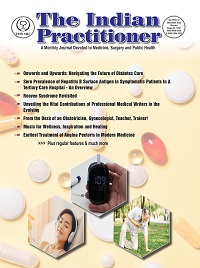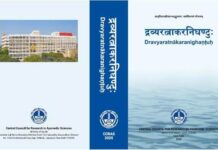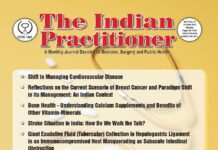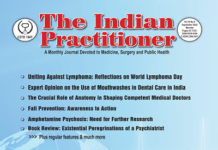 Editorial
Editorial
Onwards and Upwards: Navigating the Future of Diabetes Care
– Dr. Manish Maladkar
The escalating global prevalence of type 2 diabetes mellitus prompts a critical need for innovative approaches to its management. Managing T2DM presents challenges, and the call for treatments targeting different pathways is paramount. Current antidiabetic drugs predominantly focus on glucose control, but the surge in T2DM cases necessitates newer agents that not only regulate glucose levels but also address the multifaceted aspects of the disease.
Original Article
Sero Prevalence of Hepatitis B Surface Antigen in Symptomatic Patients in a Tertiary Care Hospital- An Overview
– Dr. M. Bharathi , Dr. A. Usharani
Viral hepatitis is a major public health problem in India that needs special attention. Hepatitis B virus is one of the important causative agents for viral hepatitis. Hepatitis B surface Antigen (HBsAg) positivity in the general population ranges from 1.1% to 12.2%, with an average prevalence of 3-4%. This study aimed to know the seroprevalence rate of hepatitis B surface antigen from symptomatic patients in our area.
Review Article
Reaven Syndrome Revisited – Dr. C B Sridhar, Dr. Mahesh DM
Reaven or Metabolic syndrome has many well-recognized cardiovascular disease risk (CVD) factors. Choosing which one of these is primarily responsible for the accelerated atherogenesis that characterizes this syndrome is a complex task. The problem is further compounded by a need for more understanding of the cellular and molecular changes resulting from insulin resistance. We aim to revisit the current understanding of Reaven syndrome or Metabolic syndrome in light of the lifestyle transition.
Commentary
Unveiling the Vital Contributions of Professional Medical Writers in the Evolving
Healthcare Landscape
– Dr. Imran Ahmed Khan
In the rapidly evolving landscape of medical research and education, the role of professional medical writers is increasingly being recognized. These professionals convey complicated medical knowledge obtained from medical research, clinical trials, and scientific publications to their peers. Maintaining scientific rigor and making sure that their work is understandable by the target audience are two competing priorities for medical writers. By following ethical norms, they may contribute to the improvement of medical practices and knowledge while upholding the scientific community’s confidence in their abilities for the betterment of healthcare and reliable evidence. The present paper discusses the role of professional medical writers and its related factors in healthcare.
Personal Interludes
From the Desk of an Obstetrician, Gynecologist, Teacher, Trainer!
– Dr. Reena Wani
There has been a lot of debate and discussion on medicine as a profession, as a career but I still look upon it as a calling, a choice one makes in life. Yet, many changes keep happening in this field, and what might have been the “Gold Standard” a decade ago, maybe trashed today as useless by advocates of “evidence-based” medicine.
As a person who has been in this field for over 30 years, particularly in medical teaching, it is my privilege to share some of my experiences and thoughts from this journey.
Music for Wellness, Inspiration and Healing
– Dr. Varsha Narayanan
As doctors and medical professionals working in various spheres of the healthcare industry, our lives are busy, challenging, and stressful. Often, we are left with little time for rejuvenation, so a hobby that is one’s own space for creativity, joy, and relaxation is a wonderful thing to have. Music has been such an outlet for me and I have always enjoyed singing, and even writing and composing my songs. It is something that I always do for my happiness and social entertainment.
Column
Earliest Treatment of Angina Pectoris in Modern Medicine
–Dr. Ashoka Jahnavi Prasad
Angina pectoris is a common condition, particularly among the elderly gentlemen of unseemly lifestyle; attacks are occasioned by cold weather, heavy meals and physical exertion. The chest pain is severe nd may make the sufferer is unable to move. It is caused, in part, by high blood pressure. The symptoms were first described systematically in 1768 by William Heberden during a lecture to the Royal College of Physicians in London but to manage the condition he could only suggest a modest lifestyle.

























